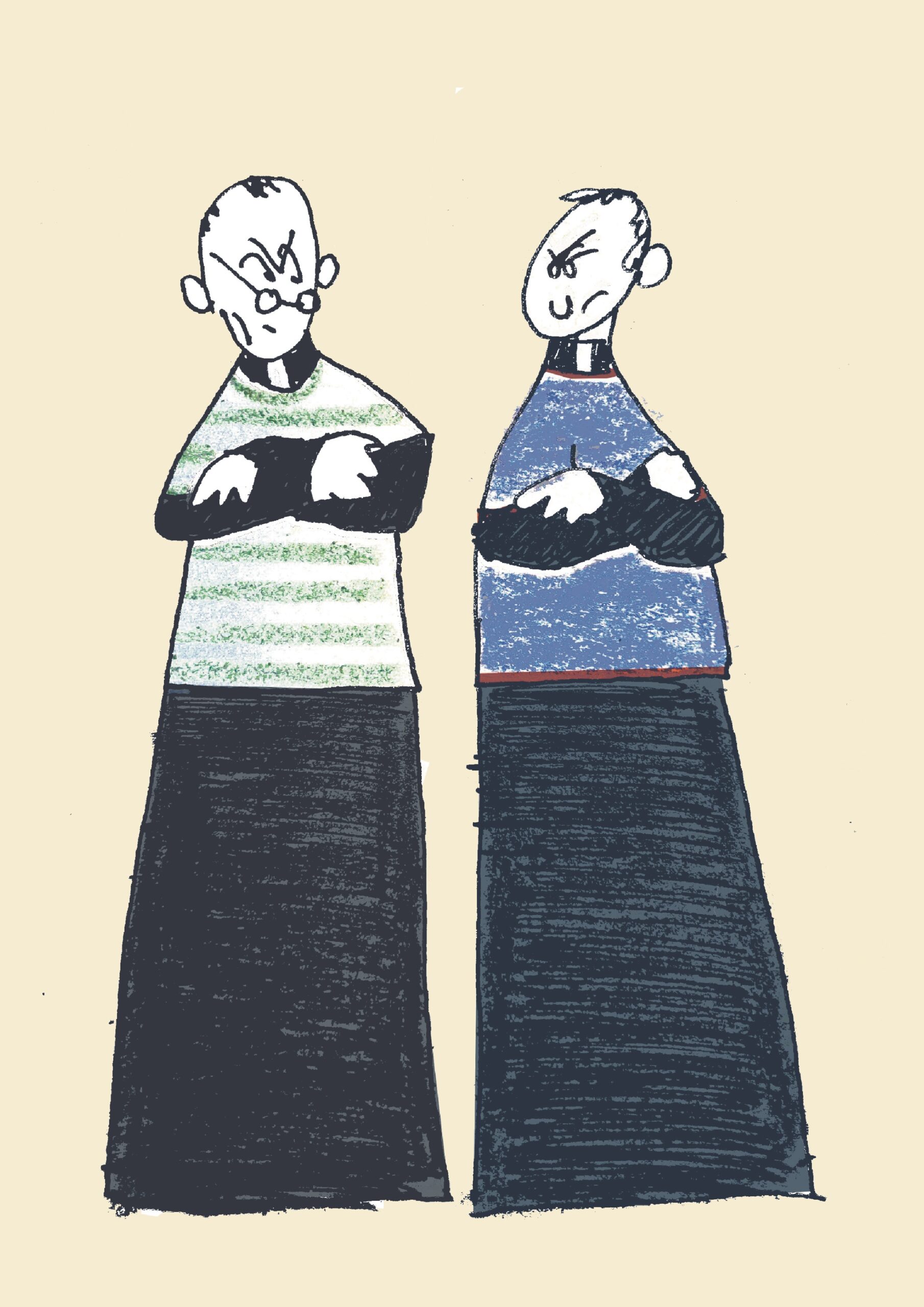Words: Jack Harrison (he/him)
Artwork: Louis Managh (he/him)
This article features in our third print issue of the year: Ashes to Ashes.
To say Scotland has a “troubled” history with sectarianism is an understatement. The religious divide between Catholics and Protestants, and subsequently Celtic and Rangers supporters, dominates cultural perceptions of Scotland, and Glasgow in particular. As the city’s graffiti makes clear, sectarianism in Glasgow is more about religious conflict than it is about religious difference. The centuries of hatred between Catholics and Protestants has long been the predominant form of oppositional expression between The Old Firm. But, it hasn’t always been this way.
The clubs first met in a friendly match in 1888 to welcome Celtic, Glasgow’s newest team, to the wonders of Scottish football: the Celts came out victorious to the tune of 5-2. Unlike Celtic, whose roots are embedded in Catholicism, Rangers hadn’t been christened, so to speak. Their association with Protestantism took shape after settlers from Belfast sought employment in the industrial heart of Glasgow. Before you could express religious bigotry towards others from the comfort of your desk chair you had to go to church, work, or the football. The influx of supporters from both denominations generated an overarching culture based on religious segregation.
The coinciding post-War depression gave birth to Glasgow’s notorious razor gangs, with many being cut down sectarian lines. The ensuing violence tore through the city and has festered ever since. While religious based violence still remains in certain pockets of the club’s supporters, recently things have felt a bit off.
It feels as though sectarianism in Scottish football is dying. While this is long overdue, it signals a shift in both Scotland’s footballing and political landscapes. According to the 2011 census, close to 2,000,000 Scots reported having no religion. This mirrors the rise of secularism across Europe, as the continent increasingly moves away from faith-based religion. The latest report on sectarianism in Glasgow also indicates that sectarian violence has been in decline since the 2010s. We are beginning to see the clarion of sectarianism lose its tune in the terraces of Scotland’s football stadiums; its presence in the historic rivalry has taken a pew for different forms of cultural opposition and, fundamentally, sporting success.
Domestic and European achievement takes up much of the aggression directed towards the clubs. Rangers’s liquidation in 2012 and their relegation to Scottish football’s fourth tier helped Celtic go on to win the league 8 times consecutively, securing a quadruple-treble in the process. However, Rangers’s league win in 2021, their 55th overall compared to Celtic’s 52, stopped Celtic achieving the coveted 10-in-a-row. Rangers made their way to a Europa League Final the following year, as talismans were gripped far tighter than any God-fearing fan would care to admit, which saw them crash out on penalties.
Ideologically, Celtic are perceived as a socialistic, anti-monarchic, and socially progressive club while Rangers are aligned with a conservative, pro-union, traditional mindset. However inaccurate this may be for substantial amounts of supporters, the two clubs typify an ideological divide in Scotland.
The political cleavages between Celtic and Rangers have been particularly visible in recent years. Look no further back than the death of Queen Elizabeth II. In lieu of thoughts and prayers, Celtic’s ultras group, The Green Brigade, hung out a banner reading: ‘FUCK THE CROWN’. Rangers opted for a more traditional approach with the Queen’s shaded silhouette over a Union Jack.
Remembrance Day services conducted at Ibrox typically involve cannons, soldiers, and stands being transformed into memorials adorned with poppies. Celtic fans recently celebrated the day against Ross County in their usual fashion by singing “The Sam Song”, a song that celebrates the missiles used against British troops during the Troubles in the 1980s, and holding a particularly vocal minute’s silence. Thankfully, the political stigmata seem to be healing, wound by wound.
The All Under One Banner movement has played its part in bridging the ideological divide between Glasgow’s giants, with supporters marching together in favour of Scottish Independence. The group Rangers Fans for Change have heralded a step in the right direction in advocating for class solidarity and an end to the sectarian divide between the two clubs: they released a statement last year denouncing the singing of “Billy Boys” for its strident anti-Catholic lyrics, and the song’s association with the eponymous fascist Billy Fullerton. There is, unsurprisingly, backlash against any sort of unity between supporters of such adversarial clubs, but this is tied to an identity of old and we should welcome whatever this strange form of peaceful hatred is.
It’s unlikely that sectarianism will die out in Scotland. For many, it gives this rivalry a sense of purpose. But, I prefer shouting about which club is better on and off the pitch over which religious sect deserves the right to live. Now, let’s bow our heads and pray it stays this way.

